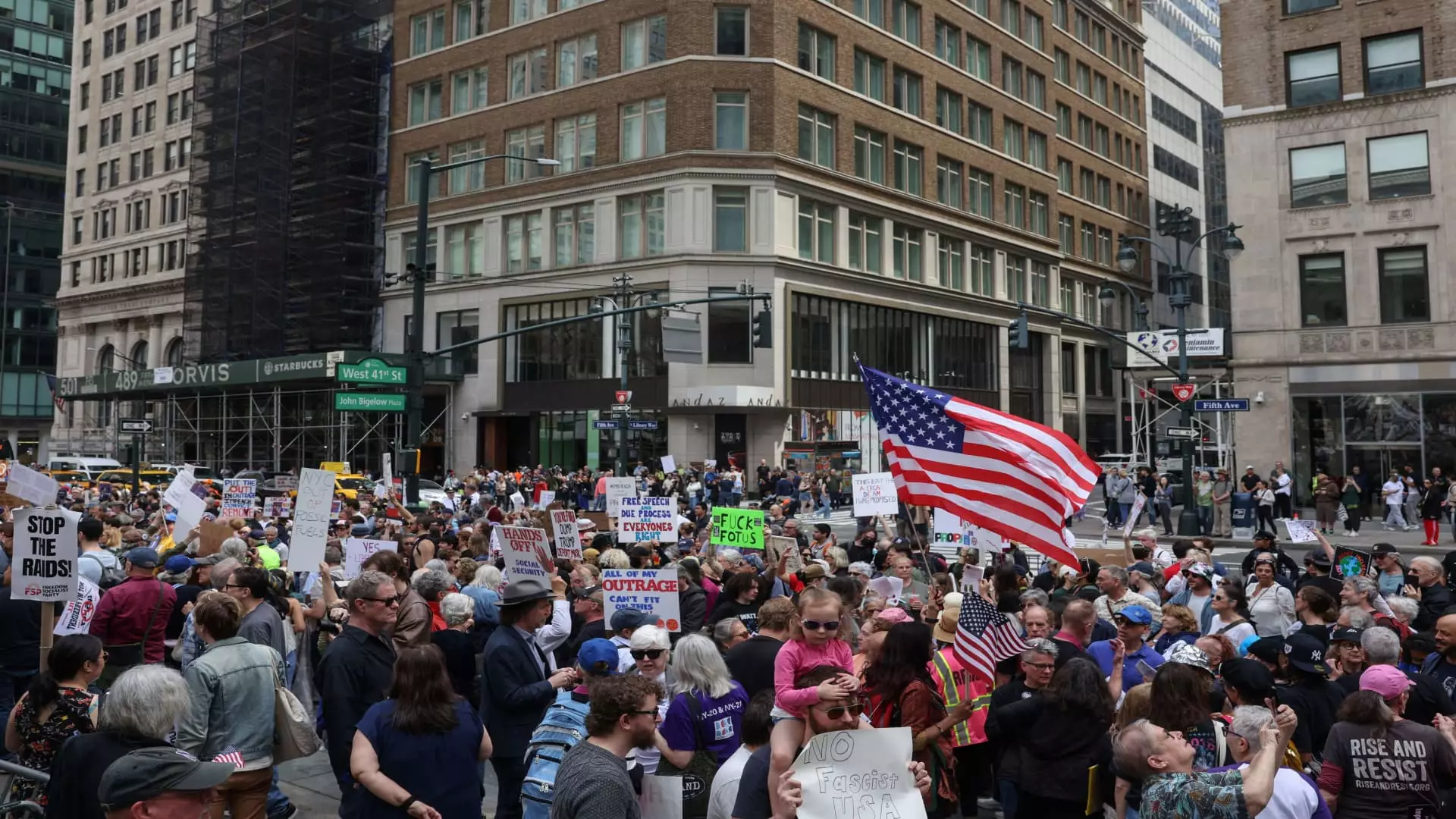In recent weeks, a palpable wave of dissent surged across the United States, as citizens from every demographic converged on city streets under the banner of democratic preservation. The rallies, sprawled across both iconic urban centers like Manhattan and more subdued towns, were stark manifestations of public discontent against what many perceive as an erosion of core democratic principles under the Trump administration. The breadth of these gatherings illuminates one universal truth: the right to protest—an embodiment of freedom—remains alive and well in the veins of the American public.
This grassroots movement is not merely a reaction to current policies; it’s a clarion call echoing the revolutionary spirit of America’s past. Citizens, including those who traversed great distances to attend commemorative events like the reenactment of the Battles of Lexington and Concord, are invoking the lessons of history to navigate today’s turbulent political landscape. Thomas Bassford, an 80-year-old retired mason from Maine, underscores this connection beautifully. His determination to impart the ideals of liberty and the necessity of vigilance to his grandsons serves as a reminder that the fight for freedom is an ongoing endeavor.
Symbols of Solidarity
From the fervent protests outside the White House to community service initiatives striving to uplift the marginalized, the fabric of this resistance is woven with threads of solidarity. Participants are not merely venting grievances but are actively seeking to engage in constructive actions, highlighting the multifaceted nature of protest. Amidst the groundswell against Trump’s administration, a striking concern emerges: the perceived dismantling of the federal apparatus that safeguards civil rights and liberties.
Opposition to Trump has morphed into a robust campaign targeting specific individuals in the government, such as billionaire adviser Elon Musk, whose involvement in downsizing government programs raises alarms among advocates for social justice. The protests expose a burgeoning awareness among Americans about the fragility of their rights and services; these gatherings are not just rallies but rallies of conscience, questioning the moral compass of our leaders and the lasting impact of their decisions on the social fabric.
Echoes of a Police State
The alarming rhetoric surrounding claims of a “police state” is disconcertingly resonant in today’s fabric of American society. Citizens like George Bryant, waving signs emblazoned with messages that denounce tyranny, fear a paradigm where dissent is met with suppression. The reference to fascism is not idly employed; it encapsulates a real dread concerning the trajectory of executive power and its implications for future generations. In conversations filled with urgency, participants detail their anxieties about the shipping away of constitutional checks and balances, an erosion that prompts historical comparisons to darker times in history.
Moreover, this is not merely a fear for the present—it is a precautionary stance for the future. As Bob Fasick articulately points out, the chilling effects of this administration’s policies threaten not only social safety nets like Social Security but also the very concept of due process. These are fundamental precepts that underpin American democracy. The voices rising in Washington echo a sentiment that refuses to be silenced; citizens united in calling for accountability and transparency in governance.
A Tapestry of Voices
As protestors fill the streets, cries against the deportation of immigrants resound with a clarity that defies the discord sowed by the administration. Melinda Charles’s apprehensions about executive overreach resonate widely, breeding a discourse around the importance of maintaining equilibrium among the branches of government. Such apprehensions reflect a collective desire for a governmental structure that remains true to its intended purpose of serving all citizens, irrespective of their identity or background.
Chanting slogans such as “No fear, no hate, no ICE in our state,” these gatherings cultivate an atmosphere of hope amidst the uncertainty, one that champions inclusivity in the face of exclusionary politics. This stark contrast indicates that while the tensions run high, the collective resolve to combat injustice is redirecting the energy toward creating spaces of acceptance and equality.
As we stand at this historical juncture, it is clear that these displays of unity are fueled by a passion deeply rooted in the bedrock of American democracy— a commitment that cannot be extinguished easily. In this electric atmosphere of resistance, the echoes of our founding ideals resonate more powerfully than ever, reminding us that the fight for justice requires a steadfast spirit.


Leave a Reply